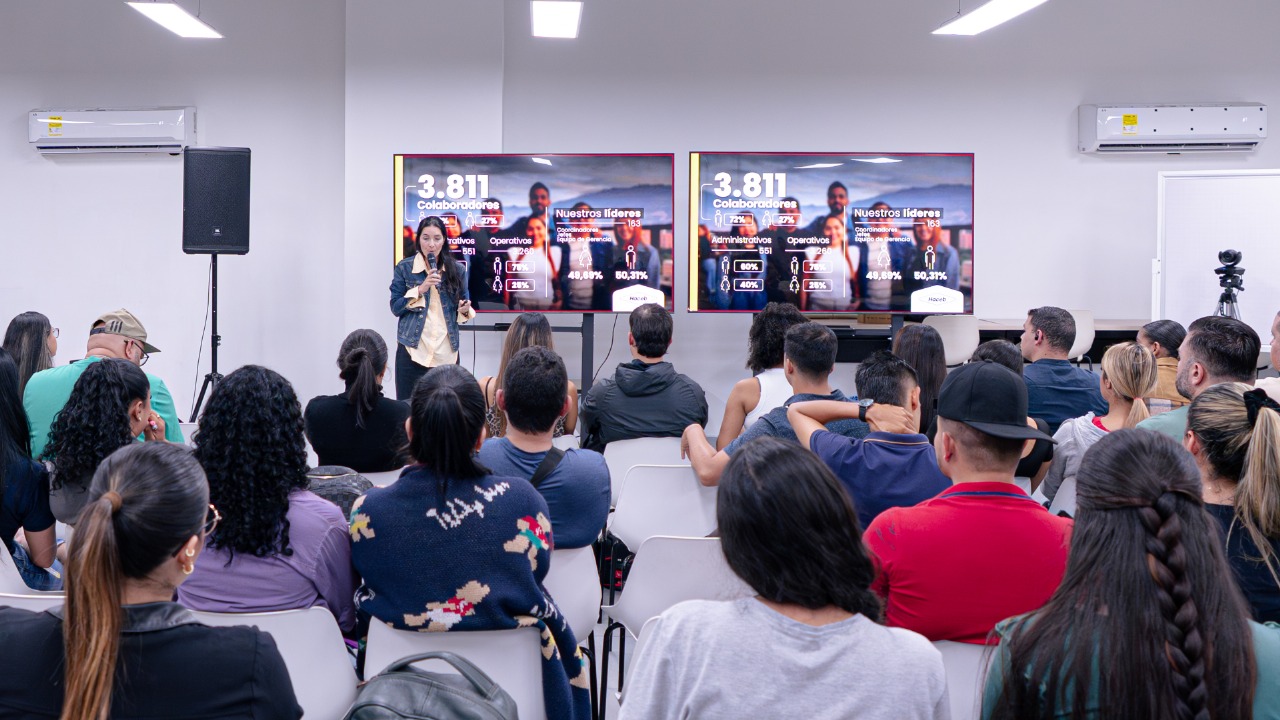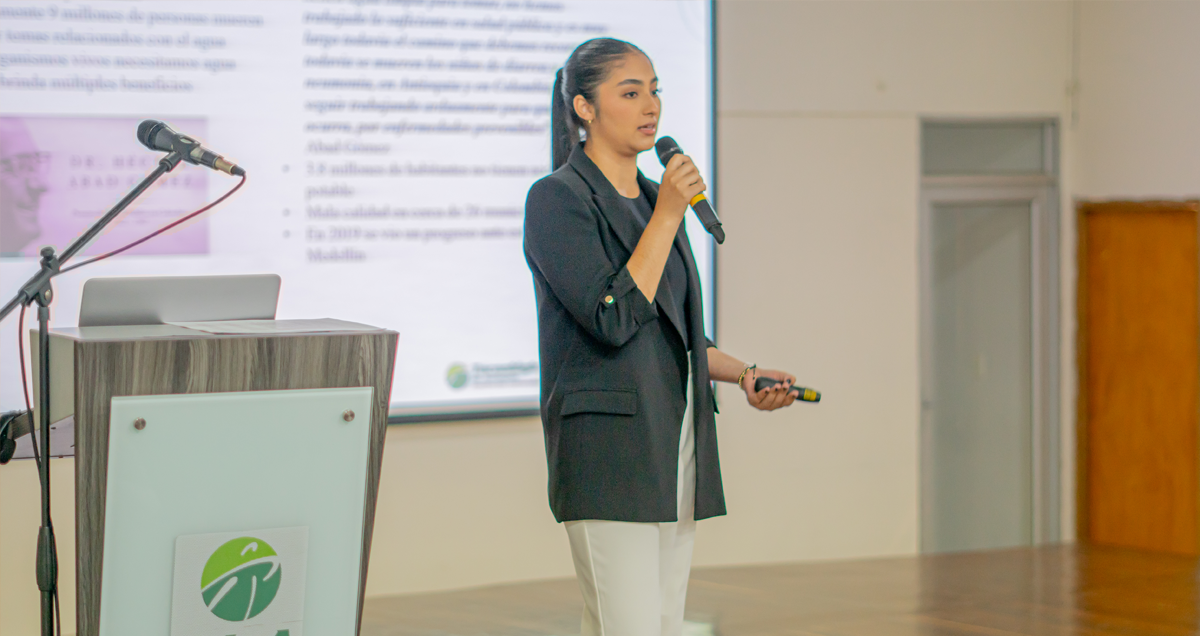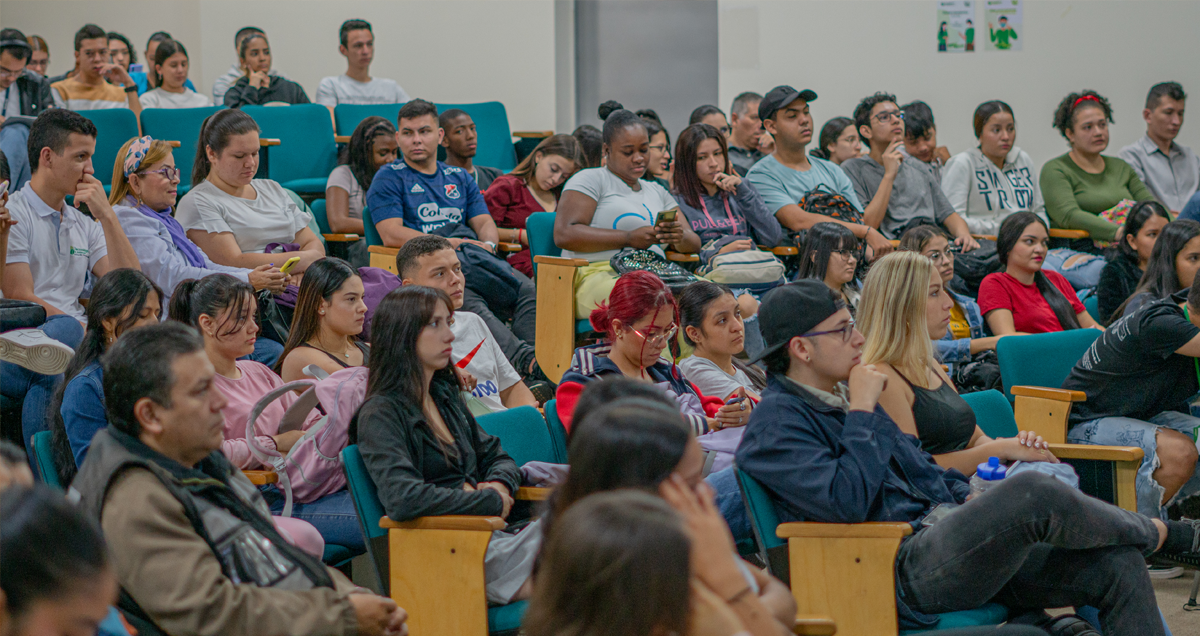El Quinto Encuentro de Ciencias Básicas y Áreas Comunes “Somos Ciencias TdeA”, que se llevó a cabo en el Auditorio Gilberto Echeverri Mejía del Tecnológico de Antioquia, el 6 de octubre, tuvo como tema: “El agua, recurso vital”, la manera cómo se convive, se interactúa y se ve el preciado líquido y cómo se piensa el cambio climático.
El Encuentro, es un evento anual organizado por el Departamento de Ciencias Básicas y Áreas Comunes y el grupo de Investigación CBATA del TdeA, en el que investigadores y estudiantes debaten y comparten sus conocimientos y experiencias en pro del fortalecimiento de los procesos de enseñanza, aprendizaje e investigación desarrollados en las diversas instituciones de educación superior del departamento.
La instalación del Encuentro, estuvo a cargo de la vicerrectora académica de la Institución Universitaria, Andrea Aguilar Barreto, quien dijo que: “Hace dos años el Tecnológico de Antioquia, inició la transformación del PEI; evolucionamos en nuestro modelo educativo y empezamos a hablar de un modelo integral centrado en el estudiante, buscando espacios donde ese concepto de integralidad se haga vivo. El de hoy, es uno de ellos: para tener conciencia medioambiental y pensar el agua como un recurso vital. El agua es vida para nuestro cuerpo. Tenemos que pensar en ese mundo que le vamos a dejar a nuestros hijos y a las futuras generaciones. Tenemos un campus TdeA verde, hermoso y procuramos tener plantas que también piden agua. Entonces, escenarios como este, están dirigidos a llevarnos a ser tener conciencia y, obviamente, a conocer todo en torno a los elementos de vida que se están construyendo”.
Por su parte, Walter Gómez Torres, coordinador del Departamento de Ciencias Básicas se refirió al objetivo del Encuentro, en los siguientes términos: “Lo que pretendemos es socializar algunos resultados productos de investigaciones realizadas, encontrarnos investigadores y estudiantes de los semilleros de investigación, para debatir, compartir conocimientos y experiencias. Seleccionamos el tema del agua, porque consideramos que es un recurso vital, una molécula muy simple que está compuesta por dos átomos que son hidrógeno y oxígeno pero que tiene una influencia muy importante en nuestra vida cotidiana y en el ecosistema. En esta oportunidad buscamos, por medio de las charlas, generar conciencia para hacer un uso adecuado y responsable del agua”.
En el evento, participaron investigadores de diferentes universidades, con distintas ponencias y miradas de cómo el agua es un recurso indispensable para la vida y un llamado al cuidado y tratamiento no solo en el mundo sino también como se está enfocando su cuidado desde las instituciones universitarias. Las ponencias presentadas, fueron las siguientes: Mariana Ossa, “Microplásticos en el agua”; Anngie Molina Macías, “Alternativas para la eliminación de nutrientes de las aguas residuales”; Sofía Raigosa Buriticá, “Herramientas biotecnológicas para potabilizar y tratar las aguas para vida”; Kellys Nallith Salcedo Hurtado, “¿Qué se ha hecho en el TdeA con relación al Plan de uso y ahorro del agua?; William Posada, “Tecnologías ancestrales para la gestión del recurso hídrico alrededor de la cuenca del Río León (Golfo de Urabá)”; José Escorcia Tafur, “Introducción a solitones”; Juan Felipe Paniagua Arroyave, “La Costa antioqueña y el cambio climático ¿Y mi cabaña en la playa?; Jonny Yepes Blandón, “Investigación y desarrollo de paquetes tecnológicos para peces nativos y comerciales con fines de conservación y seguridad alimentaria”; y Juan Darío Zea “Historias de navegantes, corsarios y piratas”.
Al final del Quinto Encuentro, se llevó a cabo la premiación de Filminuto, un espacio de creatividad en el que los estudiantes desarrollaron actividades lúdicas y filmaron videos, en torno a la importancia del agua. Al respecto, Santiago Largo Gaviria, docente del Departamento de Ciencias Básicas, destacó que: “Quisimos circunscribir nuestra propuesta de Filminutos con los estudiantes de primer semestre de Lengua Materna y Habilidades comunicativas y lo incluimos dentro de la temática del evento: el agua y el cuidado del medio ambiente. Tuvimos más de 300 filminutos producidos por los estudiantes. Finalmente, un jurado seleccionó 10, de los cuales hubo tres ganadores. Esta fue nuestra tercera versión y ya se está consolidando la propuesta, con producciones excelentes”.
![]()
We are TdeA Science: Summit on Water, a "Waterfall" of Knowledge
The Fifth Summit of Basic Sciences and Common Areas "We are TdeA Science," which was held at the Gilberto Echeverri Mejía Auditorium at the Tecnológico de Antioquia, on October 6, had as its theme: "Water, Vital Resource," the way in which the precious liquid is used, interacted and seen and how climate change is thought.
The Meeting is an annual event organized by the Department of Basic Sciences and Common Areas and the CBATA Research Group of TdeA, in which researchers and students discuss and share their knowledge and experiences in favor of strengthening the teaching, learning and research processes developed in the various higher education institutions of the department.
The opening ceremony was done by the academic vice-president of the University Institution, Andrea Aguilar Barreto, who said that: "Two years ago the Tecnológico de Antioquia began the transformation of the PEI; we evolved in our educational model and began to talk about an integral student-centered model, looking for spaces where that concept of integrality becomes alive. Today's it is one of them: to be environmentally aware and think of water as a vital resource. Water is life for our body. We have to think about the world that we are going to leave for our children and for future generations. We have a green, beautiful TdeA campus and we try to have plants that also ask for water. So, scenarios like this, are aimed at leading us to be aware and, obviously, to know everything around the elements of life that are being built."
For his part, Walter Gómez Torres, coordinator of the Department of Basic Sciences referred to the objective of the Summit, in the following terms: "What we intend is to socialize some results of research carried out, meet researchers and students of the research seedbeds, to debate, share knowledge and experiences. We selected the topic of water, because we consider that it is a vital resource, a very simple molecule that is composed of two atoms that are hydrogen and oxygen but that has a very important influence on our daily lives and on the ecosystem. On this occasion we seek, through the talks, to generate awareness to make an appropriate and responsible use of water."
In the event, researchers from different universities participated, with different presentations and views of how water is an indispensable resource for life and a call to care and treatment not only in the world, but also how its care is being seen from university institutions. The papers presented were the following: Mariana Ossa, "Microplastics in water;" Anngie Molina Macías, "Alternatives for the removal of nutrients from wastewater;" Sofía Raigosa Buriticá, "Biotechnological tools to purify and treat water for life;" Kellys Nallith Salcedo Hurtado, "What has been done in the TdeA in relation to the Water Use and Saving Plan?;” William Posada, "Ancestral technologies for the management of water resources around the Basin of the León River (Gulf of Urabá);" José Escorcia Tafur, "Introduction to solitons;" Juan Felipe Paniagua Arroyave, "The Antioquia’s Coast and climate change and my cabin on the beach?;” Jonny Yepes Blandón, "Research and development of technological packages for native and commercial fish for conservation and food security purposes;" and Juan Darío Zea "Stories of Navigators, Corsairs and Pirates."
At the end of the Fifth Summit, the Filminuto award ceremony was held, a space of creativity in which students developed playful activities and filmed videos, around the importance of water. In this regard, Santiago Largo Gaviria, professor of the Department of Basic Sciences, stressed that: "We wanted to circumscribe our proposal of Filminutos with the students of the first semester of Mother Tongue and Communicative Skills and we included it within the theme of the event: water and care for the environment. We had over 300 Filminutos (videos) produced by the students. Finally, a jury selected 10, of which there were three winners. This was our third version, and the proposal is already being consolidated, with excellent productions."






